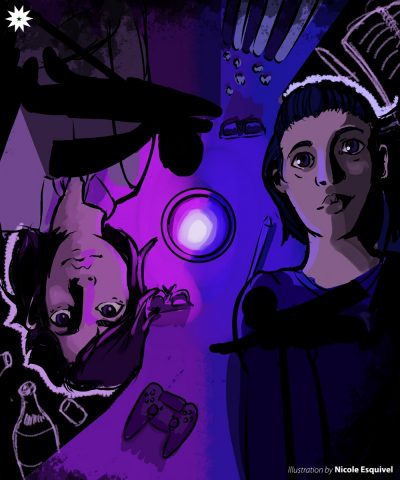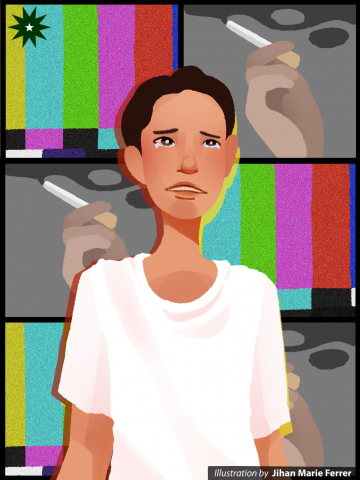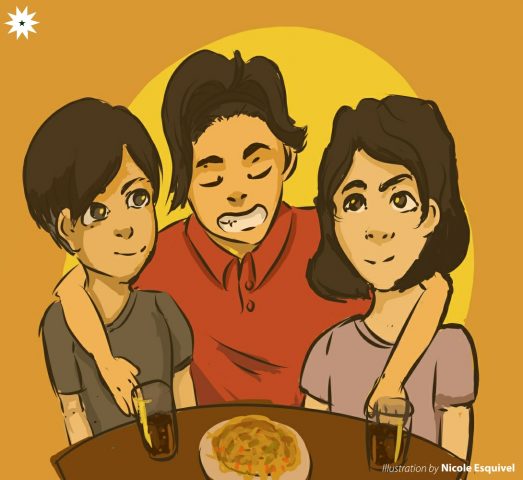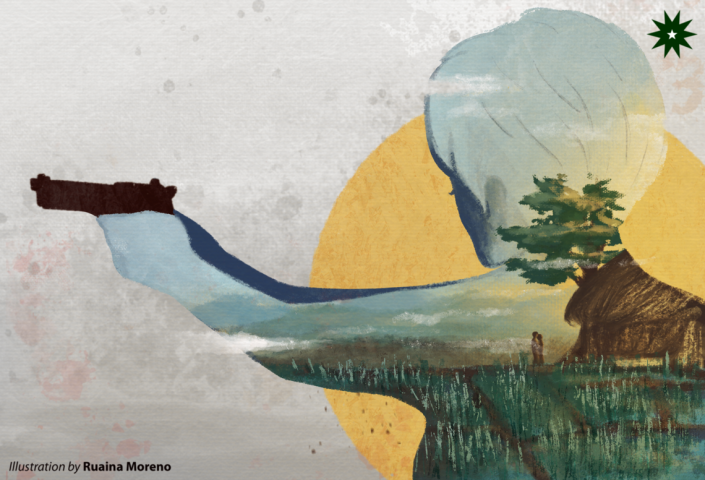With a diverse collection of stories, Virgin Labfest (VLF) 2020 offers intriguing narratives for every kind of viewer. This is part two of The LaSallian’s VLF review, appraising more thought-provoking pieces from the online showcase.
Mayang Bubot sa Tag-Araw, Sabrina
Mayang Bubot sa Tag-Araw is not afraid to experiment online. Using shadow puppetry to supplement live acting, the play fully embraces the digital platform under the direction of Mark Mirando. Drawing from real accounts of Aetas from Tarlac, Pampanga, and Zambales, Mark Norman Boquiren’s script reflects the realities of living in disputed ancestral lands through the eyes of two childhood friends.
The absorbing dialogue fuels the repressed emotions of Maya, played by Opaline Santos, and Bubot, played by Ji-ann Legaspi. Having left for the city years ago, Bubot has adapted to a more urban disposition, while Maya remained as a volunteer teacher in their hometown. When they finally meet, their divergent principles become glaringly obvious. As they tiptoe around their past afflictions, their exchange is strained with tension. When their reunion ultimately reaches its breaking point, buried grudges resurface, and their relationship splinters.
The complexity of the characters are beautifully rendered in the emotionally-charged performances of Santos and Legaspi. Maya and Bubot are both victims of circumstance, hounded by the shadows of their younger selves. As their past is slowly revealed, the play also lifts the veil that conceals its true antagonist.
With a magnetic and captivating narrative, Mayang Bubot sa Tag-Araw shows how our socio-political realities lead us to difficult choices that shape who we are and the paths we end up taking.
Rating: 3.5/4.0
Multiverse, Glenielle

The road not taken often lingers in the back of our minds. It haunts us—this hazy, sunlit alternate reality where everything went right. It comforts us to know that nothing is truly lost, but only hidden in the vastness of space and time. This is the crux of Multiverse: the hope that certain things are powerful enough to transcend limits. The possibilities promised by the concept of alternate realities is the play’s greatest strength—and downfall.
Penned by Juliene Mendoza and directed by Fitz Mabana, the story revolves around two estranged brothers, Peter and Bobby, reconnecting over a shared love of comic books and multiverses. This is encapsulated by Mendoza’s crafted animation: moving comic pages serve as the play’s background, giving the illusion that the audience is flipping through the vibrant and zany illustrations of the brothers’ imagined worlds.
This freneticism, however, quickly turns on its head. As the script plays with the infinite potential of alternate universes, the tone becomes jarring and the storytelling uneven, leading to a half-baked climax. Iggi Siasoco’s Peter and Vino Mabolot’s Bobby do make the most out of this; they are natural in their brotherly rapport and striking in their emotional scenes. Meanwhile, Jesette Namin’s Shirley is woefully underutilized—a glaring flaw in an already shaky production.
Ultimately, as they zip back and forth through the different realities, the story loses its steam. Flashy and tenuous, but with nothing much deeper to offer, Multiverse—like all fantasies—is better left in the head.
Rating: 2.5/4.0
Pilot Episode, Rafael

Pilot Episode starts by breaking the third wall: Phi Ramos’ character—an unnamed young man with bipolar disorder—narrates his hours-long wait in the hospital just to book an appointment. The story of neglect from the lobby all the way to the emergency room sets the theme for the play: the current view of mental health in the country.
Playwright Floyd Scott Tiogangco’s script is rooted in his personal experience, lending a realistic feel to the exchanges between Ramos’ character and his parents. Ramos’ raw performance is accentuated by Missy Maramara’s and Jojit Lorenzo’s portrayals as the mother and father grappling with frustration and the emerging cracks in their familial relationship.
University of the Philippines Film Professor Giancarlo Abrahan’s direction and visual style seamlessly integrates space through the multi-camera setup. Moving from the physical stage to the digital screen also brings a different dynamic to the actors’ interactions: every single emotion and movement is amplified through the camera, providing a more privy perspective for the audience to be immersed in.
The experimental format results is a play unlike any other. Relatable and heart-warming, it nails every aspect, and is undoubtedly one of the highlights of this year’s VLF.
Rating: 4.0/4.0
Dapithapon, Magz

Dapithapon takes us back to 90s nostalgia, opening with familiar anime, video games, and TV commercials from the decade. Director Sig Pecho and writer Jay Crisostomo IV’s coming-of-age tale explores the hardships of three teens at the crux of adulthood. Mishaps, mayhem, and a lot of pancit canton are what greet their teacher, Ms. Javier, played by Ina Azarcon-Bolivar, as she delivers life-changing news to the three boys.
The chemistry between actors Jerome Dawis, Quiel Quiwa, and Khayl Sison, portraying Chippy, Yani, and Dens, respectively, is the epitome of teenage curiosity, innocence, and confusion. Additionally, the comedic chops of Peewee O’ Hara returned to the VLF stage through the lovable Nanay Garcia, Chippy’s mom. Her carefree remarks and strong feelings for telenovelas made her the standout character, making her comeback all the more gratifying.
Filled with raunchy comedy, parental expectations, and forbidden infatuations, Dapithapon’s charm lies in its simple yet funny narrative of exploration and identity. The play ends as the sun sets on another day, awakening another chance to dive into what life has to offer.
Rating: 3.5/4.0
Papaano Turuan ang Babae Humawak ng Baril, Glenielle

Most war stories we see tend to weave certain harmful narratives—the glorification of masculinity and the romanticization of conquest and violence—in the service of a vague idea of a common good. Writer Daryl Pasion and director Erika Estacio add their voice to the literature, demonstrating that there is a whole lot more to be said about armed conflict. In Papaano Turuan ang Babaeng Humawak ng Baril, Pasion’s pensive script makes it clear that, this time, there is no common good—only “ang walang kamatayang siklo ng dahas at gutom.”
(The never-ending cycle of violence and hunger.)
The story starts when Oka, a soldier from an impoverished barrio comes home from duty to his pregnant wife Liling, but the happy homecoming quickly turns into a nightmare. Eshei Mesina plays the haunted Oka with just the right amount of earnestness and turmoil as he carries the play through its dark moments. Lhorvie Ann Nuevo delivers a nuanced performance as Liling, transforming from a victim of tragedy, to a woman with agency.
Other laudable elements of the play include: Terresa Barrozo’s poignant scoring, which delicately shifts the mood from pastoral fantasy to countryside terror; and Ariel Cruz’s mesmerizing animation during Oka’s monologue, painting a harrowing tale of powerlessness against the backdrop of militarized violence.
Papaano Turuan ang Babaeng Humawak ng Baril defies the romanticization of war and violence —there is no tidy ending, no big third act explosions, no hero riding off into the sunset. It leaves the viewers disturbed, filled with questions—as any proper social realism should.
Rating: 4.0/4.0
Greatness at one’s fingertips
Despite deviating from the live theatrical experience, VLF managed to create a space where theater can thrive—proving that there are ways of witnessing these outstanding “virgin” plays from home.
Whether or not the plays satisfy our craving for compelling stories, it is a feat in itself that VLF was able to persist despite various limitations, advancing our consumption of art by fearlessly treading the unknown. As the grand curtain closes the fest, VLF 2020: Kapit serves as a reminder that theater and the arts shall always have a place in society.
